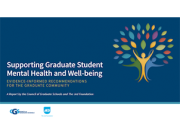You are on CGS' Legacy Site.
Thank you for visiting CGS! You are currently using CGS' legacy site, which is no longer supported. For up-to-date information, including publications purchasing and meeting information, please visit cgsnet.org.

FOR IMMEDIATE RELEASE
CGS Contact: Katherine Hazelrigg – (202) 461-3888 / khazelrigg@cgs.nche.edu
JED Contact: Manuela McDonough – (212) 647-7544 / Manuela@jedfoundation.org
Statement of Principles and Commitments Endorsed by 150+ Universities
Washington, DC – In recent years, climate surveys and research studies have demonstrated a critical need to prioritize the mental health of postsecondary students, but little information exists about programs and services designed to address the needs of master’s and doctoral students. Today, the Council of Graduate Schools (CGS) and The Jed Foundation (JED) lead the way in addressing that gap with the release of data, resources, and evidence-informed recommendations.
Their report, Supporting Graduate Student Mental Health and Well-being, contextualizes the urgency of this issue and includes results from a CGS member survey, priority areas for future research, and examples of programs aligned with key recommendations. The findings and recommendations summarized in the report are intended to provide a starting point for discussion and action for all campus groups with a vested interest in the quality of graduate education, including presidents and provosts, graduate deans, department chairs, faculty members, graduate students, and funders. Also embedded in the report is a “Statement of Principles and Commitments of Graduate Deans,” which provides institutions a blueprint for action to support the academic success and well-being of all students. As of today, 150+ universities have endorsed the principles and commitments.
The release of the report marks the culmination of that 22-month project, supported by the Andrew W. Mellon Foundation and the Alfred P. Sloan Foundation. CGS and JED, along with a 14-person advisory committee with expertise in the field and participants in an October 2020 virtual convening, provided input and information that informed the report’s recommendations. The convening included graduate deans and students from 29 CGS member universities, disciplinary society representatives, funders of graduate education, and researchers.
Key findings in the member survey provide a sense of how universities are currently approaching graduate student mental health and well-being. While only 24% of graduate deans indicated their campus-wide strategic plan, vision, or mission statement specifically references graduate students in the member survey, 49% noted that their institutions have a taskforce or committee related to the emotional well-being of graduate students.
“Given the diversity of the graduate student population both in terms of life stage and career goals, considering the unique needs of graduate students in campus mental health plans must be a priority,” said CGS President Suzanne T. Ortega. “Establishing a shared set of values and a framework of principles and commitments is just the first step toward creating more inclusive, supportive program and campus environments and ensuring more equitable access to care. Our work with JED lays the foundation for future research on this critically important topic.”
“The findings from this project will be instrumental in moving forward with efforts to promote graduate student mental health and well-being,” said Dr. Nance Roy, chief clinical officer, The Jed Foundation and assistant clinical professor, Department of Psychiatry, Yale School of Medicine. The recommendations provide actionable steps to support graduate student mental health as well as opportunities for future study. JED is proud to have partnered with CGS on this valuable work.”
###
About CGS
The Council of Graduate Schools (CGS) is an organization of approximately 500 institutions of higher education in the United States and Canada engaged in graduate education, research, and the preparation of candidates for advanced degrees. The organization’s mission is to improve and advance graduate education, which it accomplishes through advocacy in the federal policy arena, research, and the development and dissemination of best practices.
About The Jed Foundation (JED)
JED is a national nonprofit that exists to protect emotional health and prevent suicide for our nation’s teens and young adults. We’re partnering with high schools and colleges to strengthen their mental health, substance misuse and suicide prevention programming and systems. We’re equipping teens and young adults with the skills and support to grow into healthy, thriving adults; and we’re encouraging community awareness, understanding and action for young adult mental health. Learn more at jedfoundation.org.




